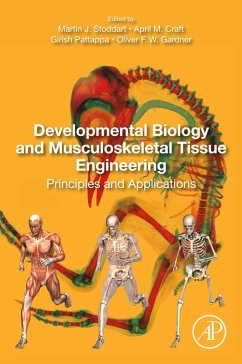Developmental Biology and Musculoskeletal Tissue Engineering: Principles and Applications focuses on the regeneration of orthopedic tissue, drawing upon expertise from developmental biologists specializing in orthopedic tissues and tissue engineers who have used and applied developmental biology approaches. Musculoskeletal tissues have an inherently poor repair capacity, and thus biologically-based treatments that can recapitulate the native tissue properties are desirable. Cell- and tissue-based therapies are gaining ground, but basic principles still need to be addressed to ensure successful development of clinical treatments. Written as a source of information for practitioners and those with a nascent interest, it provides background information and state-of-the-art solutions and technologies.
Recent developments in orthopedic tissue engineering have sought to recapitulate developmental processes for tissue repair and regeneration, and such developmental-biology based approaches are also likely to be extremely amenable for use with more primitive stem cells.
Recent developments in orthopedic tissue engineering have sought to recapitulate developmental processes for tissue repair and regeneration, and such developmental-biology based approaches are also likely to be extremely amenable for use with more primitive stem cells.
- Brings the fields of tissue engineering and developmental biology together to explore the potential for regenerative medicine-based research to contribute to enhanced clinical outcomes
- Initial chapters provide an outline of the development of the musculoskeletal system in general, and later chapters focus on specific tissues
- Addresses the effect of mechanical forces on the musculoskeletal system during development and the relevance of these processes to tissue engineering
- Discusses the role of genes in the development of musculoskeletal tissues and their potential use in tissue engineering
- Describes how developmental biology is being used to influence and guide tissue engineering approaches for cartilage, bone, disc, and tendon repair
Dieser Download kann aus rechtlichen Gründen nur mit Rechnungsadresse in A, B, BG, CY, CZ, D, DK, EW, E, FIN, F, GR, HR, H, IRL, I, LT, L, LR, M, NL, PL, P, R, S, SLO, SK ausgeliefert werden.


